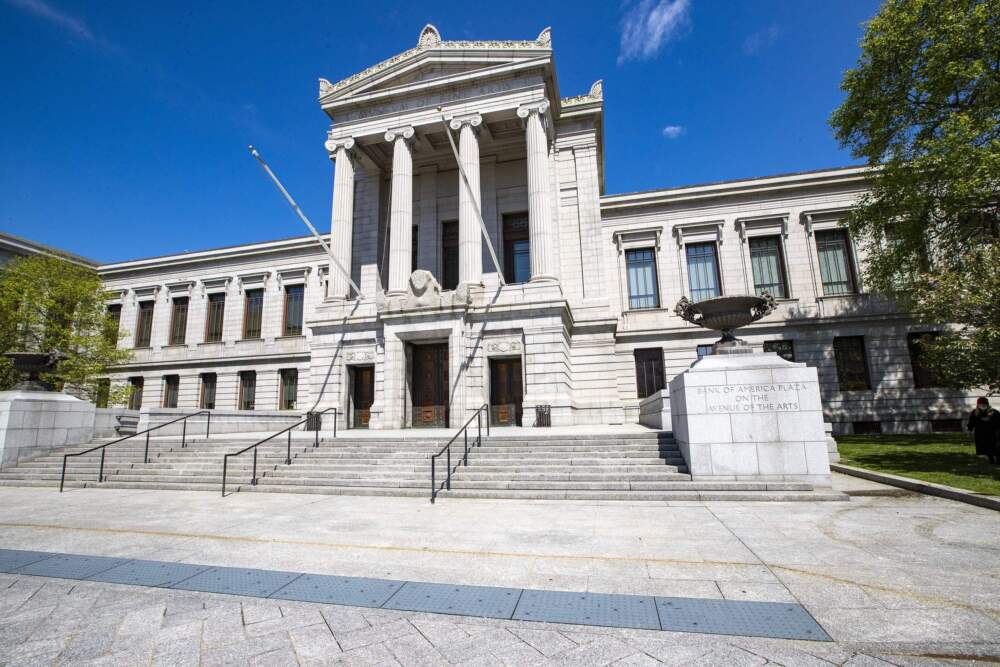Advertisement
MFA announces plans to pull Native objects from display

The Museum of Fine Arts, Boston announced Thursday that it will pull eight Native American objects from display.
The move comes after updated federal guidelines to the Native American Graves Protection and Repatriation Act, or NAGPRA, went into effect in January. The "duty of care" guidelines require museums to get “informed consent” from affiliated tribal representatives before exhibiting or doing research on cultural items.
The items in question at the MFA include one textile, two pottery vessels and five musical instruments that “may be considered sacred or ceremonial within their communities of origin,” the museum said in a statement. The MFA will remove the items over the upcoming weeks until it can consult with affiliated tribal nations.
Ethan Lasser, who chairs the MFA's Art of the Americas, said it's a step in the right direction.
"The more that museums are in conversation and building relationships with tribal communities, around the stewardship of objects from ... Indigenous cultures, the better," he told WBUR.
Under NAGPRA, which was enacted in 1990, cultural items can include funerary objects, sacred objects or objects that “have ongoing historical, traditional, or cultural importance central to the Native American group.” The updated guidelines mandate that if "a museum has known sacred objects or objects of cultural patrimony on exhibit and has not consulted on those objects, the museum should remove or cover the objects until consultation can be conducted and consent can be given."
The MFA said in the statement that it is “committed to elevating Native American voices throughout our galleries and responsibly stewarding the Native American objects in our collection.”
The museum hired its first curator of Native American Art in 2021 and brought on a NAGPRA coordinator in 2023. Lasser also noted that the museum is "proud that we now have works by Native artists on every floor of the Art of the Americas wing for the first time since it opened in 2010."
The MFA joins organizations across the nation reconsidering their collections, from the Cleveland Museum of Art to the American Museum of Natural History, which announced on Jan. 26 that it would close two of its major halls. Locally, Harvard University's Peabody Museum of Archaeology and Ethnology announced on Tuesday that it will remove funerary objects from its galleries.
The Springfield Science Museum has also pulled certain items from display and "will be consulting with appropriate parties," a museum spokesperson told WBUR. Other items will remain on view, which the museum "has permission from tribal representatives to exhibit." The spokesperson added the museum has been reimagining its display of Native American objects for the past three years
The Cape Cod Museum of Natural History has four human remains in its collection. In an email to WBUR, the museum stated that it's securing funding to inventory and “catalog a collection that contains two of the four human remains.” The remains were labeled “culturally unidentifiable” (a category that has since been eliminated in the updated NAGPRA guidelines) when they were reported to NAGPRA in 1996, which slowed the process of repatriation.
“We are confident that after the assessment is done, we will be able to designate a cultural affiliation,” Kate Roderick, curator and digital manager, said in an email to WBUR. “At that point, we intend to work with [NAGPRA] to return the remains.”
The museum has until 2029 to repatriate the remains and any related funerary objects.
Some museums have already adopted policies that mirror the updated guidelines. Since 2019, the Robert S. Peabody Institute of Archaeology in Andover has had a policy against publicly displaying Native American items in its collections without consent and involvement from affiliated tribal communities.
The museum has also required consultation and consent from “tribes for conducting research on any material in the collection” since 2021. For the human remains and funerary objects left in its collection, the museum says it is currently working with tribal nations and that its goal is to repatriate all of the items.
“We are regularly reaching out to Tribes and Nations asking to consult about individuals and funerary belongings, as well as other cultural items,” said Director Ryan Wheeler.
Back at the MFA, Lasser says that the museum is in a "good position of having the people in place to do the work" to comply with NAGPRA's updated guidelines. "We're taking this very seriously and are moving very deliberately while trying to do the work of sharing Native American art with our audiences."
